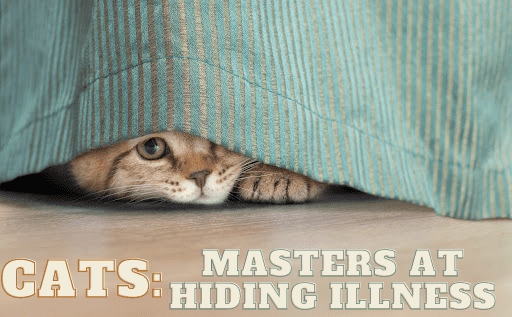Cats are great at many things; entertaining themselves with boxes, leaping tall shelves in a single bound, and moving about through life as if nothing is wrong. Unfortunately, one of these skills includes a natural ability to hide their illnesses.
Unfortunately, this innate ability to hide illness and disease sometimes means that you may not know anything is wrong with your cat until it’s too late. Too many times, friends and family lose cats unexpectedly to a disease when they never had a real chance to say good-bye. Though cats are masters at hiding illness, there are ways to detect that something is wrong, if you pay attention.
Weight Loss
Drastic weight loss is not normal for a cat, so if you notice that though your cat seems to be eating, he or she is still losing weight, or they suddenly lose their appetite, this could be a sign of illness. Normally in cats weight gain is usually only a sign of excessive eating.
Messy or Unkempt Fur
Cats are normally excessive groomers. They like to look good, and they don’t mind doing the work. When cats are stressed and nervous about anything, they tend to stop grooming themselves and their fur can become clumpy and begin to shed far more than usual. This is a sign that something may be wrong. Cats can get over stressed from moving, illness or any change of their usual environment.
Bad Breath
Bad breath can be a sign of periodontal disease, or other issues with your cat’s teeth or gums. If you notice bad breath consistently with your cat, it is wise to take them to the vet as soon as possible.
Respiratory Issues
Shallow breathing or a series of quick short breaths, can be a sign that your cat is suffering from health woes. You will need to pay close attention to your cat to notice. If you have a cat that is maturing, spend a lot of time with them and get to know their natural habits. This is the only way you will be able to detect if there are any real health concerns.
Preventive Care
Cats are very good at hiding disease. Annual exams and lab work help us find problems early. Taking your cat for regularly scheduled checkups, and providing them with a good home and a healthy diet, will help tremendously in keeping them active and vibrant. Since cats won’t really complain when they are in pain or discomfort, you must be mindful of checking to see if any of their habits have changed, such as an increased intake of water, and hiding out under beds and closets. Even behavior problems may be due to physical disease.
